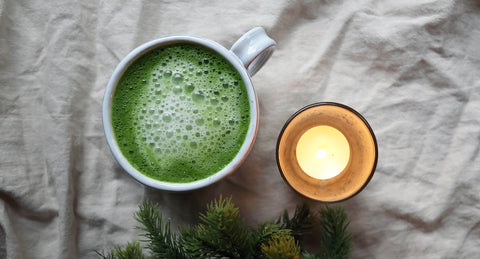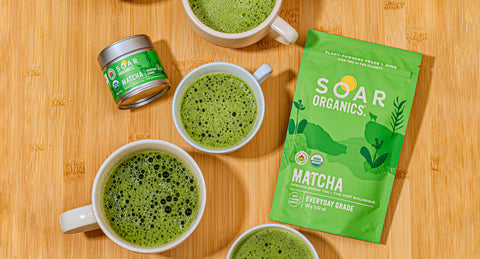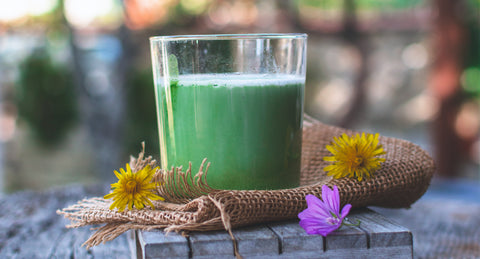Matcha, the finely ground powder of specially grown and processed green tea leaves, has gained immense popularity worldwide for its vibrant color, unique taste, and numerous health benefits. However, a significant debate remains for matcha enthusiasts and newcomers alike: organic vs. conventional (non-organic) matcha. In this post, we’ll dive deep into the distinctions between the two and why organic matcha stands out as the superior choice.
What is Matcha?
Before delving into the differences, let's briefly cover what matcha is. Matcha is a type of green tea that is grown and processed differently than regular green tea. The tea plants used for matcha are shade-grown for about three weeks before harvest, which increases the chlorophyll content and enhances the production of amino acids. After harvesting, the leaves are steamed, dried, and then ground into a fine powder.
Conventional Matcha
Conventional matcha refers to matcha produced using standard agricultural practices, which often include the use of synthetic fertilizers, pesticides, and herbicides. These practices aim to maximize yield and minimize costs, but they come with several drawbacks:
-
Chemical Residues: Conventional matcha may contain residues of pesticides and fertilizers. Even though these are within legal limits, long-term consumption can raise health concerns.
-
Environmental Impact: The use of synthetic chemicals can lead to soil degradation, water contamination, and negative effects on local ecosystems.
- Taste and Quality: The presence of chemicals can affect the natural taste of matcha, potentially leading to a more bitter flavor profile.
Organic Matcha
Organic matcha, on the other hand, is cultivated without synthetic fertilizers, pesticides, or herbicides. It adheres to organic farming principles that prioritize environmental sustainability and health. Here’s why organic matcha is the preferred choice:
- Purity and Health Benefits:
-
No Chemical Residues: Organic matcha is free from harmful chemicals, ensuring you consume a pure product. This is particularly important as matcha is consumed in powdered form, meaning you ingest the entire leaf.
-
Nutrient-Rich: Organic farming practices often result in higher nutrient content. Organic matcha can have higher levels of antioxidants, vitamins, and minerals compared to its conventional counterpart.
- Superior Taste:
- Organic matcha typically boasts a more vibrant, nuanced flavor. The absence of chemical residues allows the natural sweetness and umami characteristics to shine through, providing a smoother, more enjoyable experience.
- Environmental Sustainability:
-
Soil Health: Organic farming maintains and enhances soil health by using natural composts and crop rotations. This leads to more resilient ecosystems.
-
Biodiversity: By avoiding synthetic chemicals, organic farms support biodiversity, fostering healthy insect populations, and reducing the risk of chemical runoff into nearby water bodies.
- Support for Ethical Practices:
- Choosing organic matcha often means supporting small-scale farmers who employ traditional, sustainable methods. This can contribute to fairer trade practices and better livelihoods for farming communities.
Making the Switch: How to Choose Quality Organic Matcha
If you’re convinced of the benefits of organic matcha, here’s how to ensure you’re getting the best quality:
-
Certification: Look for matcha that is certified organic by reputable organizations such as USDA and COR (Canadian Organic Regime).
-
Origin: High-quality matcha comes from Japan, with regions like Uji, Kyoto and Kirishima, Kagoshima being renowned for their superior matcha production.
-
Color: Quality matcha should be a vibrant, bright green. A dull or yellowish tint can indicate lower quality.
-
Texture: Good matcha is finely ground and smooth. If it feels gritty, it might not be of the highest quality.
- Aroma and Taste: High-quality organic matcha should have a fresh, grassy aroma and a balanced taste with natural sweetness and umami, without excessive bitterness.
Conclusion: Why Organic Matcha?
While conventional matcha might be more accessible and sometimes cheaper, the benefits of organic matcha are hard to ignore. From the absence of harmful chemicals to superior taste and environmental sustainability, organic matcha offers a holistic approach to enjoying this ancient tea. By choosing organic, you’re not only prioritizing your health but also contributing to a more sustainable and ethical tea industry. So, next time you’re in the market for matcha, go organic and experience the difference for yourself!



